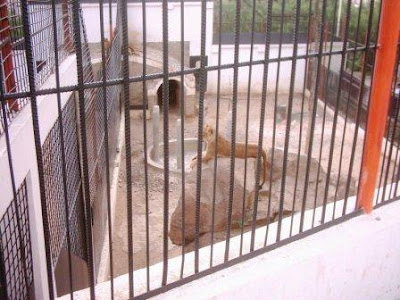Sana'a Zoo And Yemen's Disappearing Wildlife
With the population increasing at one of the fastest rates in the world and high ways now extending to most corners of Yemen, the country is fast losing its wildlife. Yemen used to be rich in wildlife. A few years ago, one could easily spot wild animals like baboons, foxes, gazelles and even hyenas, but now - that's no more; birds and sea turtles too, are becoming rarer. It's reported that wildlife is disappearing in the Arabian region faster than any where else in the world.

Above, in a zoo in Sana'a, is the Arabian leopard, almost extinct in the wild and now found in very remote regions, especially between the borders of Yemen and Oman. If nothing is done, fast, to save these beautiful creatures, they will soon disappear completely in the wild.

Above: the caracal, once, too, easily seen in the wild, is fast disappearing. Except in the zoo. I hate seeing animals in zoos; they should be in the wild.
 Lions are said to have been in the Yemeni wild, long ago. These, above, are said to be descendants of those wild lions.
Lions are said to have been in the Yemeni wild, long ago. These, above, are said to be descendants of those wild lions.
Can Yemen protect and save its wildlife, more - both on land and in the seas? Can the Arab world, do more to protect wildlife?
The Yemeni Leopard Recovery Program is trying to save the very few remaining leopards in the wild; just as the some conservationists, are trying their best to protect the few remaining wild animals in the country. But they can't succeed without focused and concerted efforts by ordinary Yemenis too. Most Yemenis are not aware of the importance of protecting and conserving wildlife; the public should be made aware and sympathetic to protecting and saving wildlife. Both on land and in the seas.
For more on Yemen's wildlife go here, here and here

Above, in a zoo in Sana'a, is the Arabian leopard, almost extinct in the wild and now found in very remote regions, especially between the borders of Yemen and Oman. If nothing is done, fast, to save these beautiful creatures, they will soon disappear completely in the wild.

Above: the caracal, once, too, easily seen in the wild, is fast disappearing. Except in the zoo. I hate seeing animals in zoos; they should be in the wild.
 Lions are said to have been in the Yemeni wild, long ago. These, above, are said to be descendants of those wild lions.
Lions are said to have been in the Yemeni wild, long ago. These, above, are said to be descendants of those wild lions.Can Yemen protect and save its wildlife, more - both on land and in the seas? Can the Arab world, do more to protect wildlife?
- There is not an animal (that lives) on the earth, nor a being that flies on its wings, but (forms part of) communities like you. Nothing have we omitted from the Book, and they (all) shall be gathered to their Lord in the end . (Al-An'am 006:038 )
- Evil (sins and disobedience of Allâh, etc.) has appeared on land and sea because of what the hands of men have earned (by oppression and evil deeds, etc.), that Allâh may make them taste a part of that which they have done, in order that they may return (by repenting to Allâh, and begging His Pardon). (Ar-Rum 003:041)
The Yemeni Leopard Recovery Program is trying to save the very few remaining leopards in the wild; just as the some conservationists, are trying their best to protect the few remaining wild animals in the country. But they can't succeed without focused and concerted efforts by ordinary Yemenis too. Most Yemenis are not aware of the importance of protecting and conserving wildlife; the public should be made aware and sympathetic to protecting and saving wildlife. Both on land and in the seas.
For more on Yemen's wildlife go here, here and here

